2015 Yamaha FX Cruiser SVHO Review
Flagship luxury cruiser loaded with technology
Yamaha has introduced a lot of new innovations for 2015, and one boat that gets nearly all of it is the flagship FX Cruiser SVHO. From a new lightweight hull and deck, to electric trim and the company’s heralded RiDE dual handlebar controls, the FX Cruiser SVHO is loaded to say the least.
And as we’ll see shortly, all those features come at a very attractive price.
What’s New
We’ll save the performance and handling commentary for a few paragraphs. For now, let’s get right to the hit list.
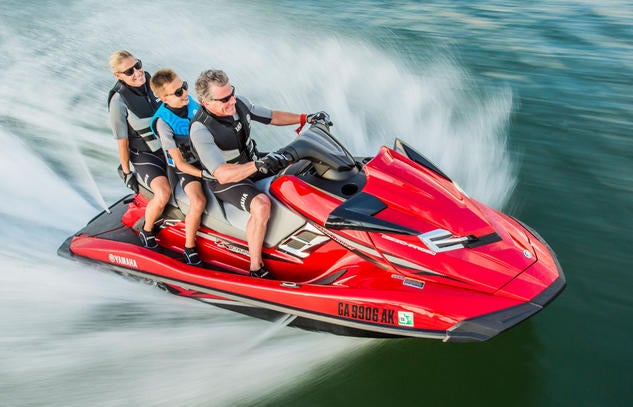 Yamaha squeezed a lot of new upgrades into its FX Cruiser SVHO for 2015.
Yamaha squeezed a lot of new upgrades into its FX Cruiser SVHO for 2015.First up is that new hull material. Consumers may be familiar with Yamaha’s proprietary NanoXcel material. In a move to lighten weight while retaining hull rigidity and strength, Yamaha engineers reengineered Sheet Molding Compound (SMC) on a microscopic level, swapping out the “filler” material from calcium carbonate to exfoliated clay. The move allowed Yamaha’s SMC vendor to change the type of bond used in the SMC process, and as a result, use substantially less filler. Scientific explanation aside, the end result was a lighter material that retained all the necessary strength.
For 2015, the company is unveiling the next generation of NanoXcel, NanoXcel 2. In scientific speak, it uses that same nano-engineered clay but introduces glass micro-bubbles to develop a stronger resin that relies on even less raw material. In terms that matter to the PWC enthusiast, it drops the weight of FX SVHO models by an additional 46 pounds, while still retaining the boat’s structural integrity.
COMPARISON: Read our review of the 2015 Kawasaki Ultra 310LX
Number two on the hit list is something many enthusiasts have long clamored for – electric trim. Why go away from the manual version WaveRunners have featured for so long? Manual trim can be difficult to adjust at speed, as the rider is literally fighting the force of water exiting the jet pump. Electric trim doesn’t have that limitation. Yamaha places the trim buttons in a familiar position on the left handgrip, right behind the new RiDE lever.
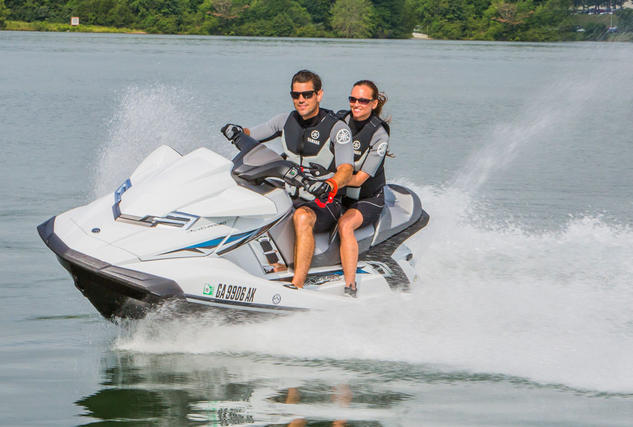 Electric trim allows users to easily adjust the craft’s trim at speed.
Electric trim allows users to easily adjust the craft’s trim at speed.Which, is obviously, number three, although to be fair it’s easily the biggest innovation of the bunch. RiDE changes the way you ride by giving the FX Cruiser SVHO dual handlebar throttle controls. The righthand throttle is used for forward motion; the lefthand throttle is used for reverse. Though the company has shied away from calling the RiDE control a brake, brake it does when grabbed out on the water. Grabbing the lefthand throttle lowers the reverse bucket and redirects thrust forward, rapidly slowing the craft, similar to Sea-Doo’s iBR system. One thing Yamaha does differently, however, is divert that thrust to the sides, rather than force it down. The result is a controlled slowing that keeps the craft amazingly level in the water, and avoids the sudden, bow-down momentum you can feel at high speed with iBR.
RiDE is also welcome at the dock or launch ramp. Start the FX Cruiser SVHO and it stays put in a neutral setting. You can then choose either the forward or reverse lever to move in the direction you want. Release both levers and the craft returns to neutral.
 Yamaha’s new RiDE gives the FX Cruiser SVHO dual throttle controls, essentially giving the craft the ability to brake.
Yamaha’s new RiDE gives the FX Cruiser SVHO dual throttle controls, essentially giving the craft the ability to brake.There’s one trait worth noting. RiDE gives the operator quite a bit of power in reverse. This can be surprising in tight quarters until you learn to go gently on the lever, but it can also be a bonus when you need that added power to get you out of a problem. In reality, a few minutes of practice is all you need to get to know the system’s nuances.
What’s Familiar
That’s a lot of change for the FX Cruiser SVHO, but in reality it’s a lot of refinement. Deep down, the boat is still quite familiar.
COMPARISON: Read our review of the 2014 Sea-Doo GTX Limited iS 260
Engine? It’s the Super Vortex High Output (SVHO) variant of the 1.8-liter that made its debut in 2014. Based on the SHO engine platform, it features a new supercharger and larger, more efficient intercooler, along with larger, more-efficient oil cooler, larger fuel injectors, and forged steel pistons. According to Yamaha’s comparison numbers, it offers 20% more power than the SHO and a 60% improvement in boost. To handle the power, the company increased the pump diameter to 160 mm, and borrowed an eight-vane interior from race models. The company also made a welcome switch to a top-loader scoop-style intake grate to more efficiently load the pump’s upper regions and extended the rideplate.
 Power is provided by Yamaha’s 1.8-liter supercharged Super Vortex High Output engine, which churns out more than 250 horsepower.
Power is provided by Yamaha’s 1.8-liter supercharged Super Vortex High Output engine, which churns out more than 250 horsepower.Horsepower isn’t quoted, but it’s above 250, which puts the model right in line with competitor’s flagship models. During my testing this year on a late summer day on a Georgia lake, it easily surpassed the 65 mph mark with a light load, and accelerated brutally off the bottom end, especially given the boat’s newly reduced weight.
Thankfully, the hull can more than handle the power. FX models seem to have found their sweet spot in recent years. Rough water is still one of their strongest points, as the hull tracks straight and true and doesn’t succumb to the influence of chop or confused seas. But calm waters are also the boat’s playground. On that glassy Georgia lake, I was able to carve incredibly tight, precise corners with an intuitive inside lean at nearly full speed with complete confidence.
Let’s Cruise
For all its performance attributes, the Cruiser is still aptly named. The saddle is the obvious highlight. It’s supple and supportive at once, with welcome bolsters to provide support for both captain and passenger’s backs. It’s also tiered rather dramatically. That way, you won’t be stuck staring at the back of the driver’s head should you be a passenger. The Cruiser also get handy pull-up cleats, and the choice of two exterior colors, pure white or torch red metallic.
Non-exclusive features like cruise control and no-wake mode also enhance the cruising experience. Use either to prevent throttle finger fatigue, and don’t forget to use cruise control to also deliver a better towing experience during watersports.
 Cruise control makes towing skiers and wakeboards easier.
Cruise control makes towing skiers and wakeboards easier.Other highlights include the spring-loaded boarding step with its welcome, flattened step area, grippy Hydro-Turf traction mats, tilt steering, and Yamaha’s remote security system which can lock or unlock the ignition, as well as activate a fuel-saving, low-speed mode.
Welcome Change
A familiar FX Cruiser SVHO? Sure, it still delivers what buyers have come to expect from the Yamaha flagship. But with a lighter hull, new electric trim, and all the enhanced control of RiDE, this is really a much better, much more refined model than in years’ past.
COMPARISON: Read our review of the 2014 Yamaha FX Cruiser HO
And not to be overlooked, it comes in at one of the most competitive prices – $15,799 – of any flagship model.
| 2014 Yamaha FX Cruiser SHVO Specs | |
| Length | 140.2 inches |
| Beam | 48.4 inches |
| Dry Weight | 836 lbs |
| Engine | Supercharged w/intercooler 4-cylinder EFI |
| Displacement | 1812 cc |
| Rated Horsepower | N/A |
| Fuel Capacity | 18.5 gal. |
| Combined Stowage Capacity | 33.2 gal. |
| Colors | Pure White or Torch Red Metallic |
| Price | $15,799 |
Get PersonalWatercraft.com in your Inbox!
Like PersonalWatercraft.com on Facebook
Comments
Most Popular
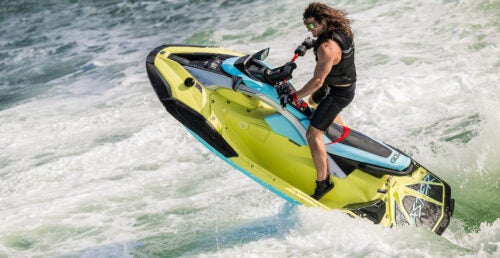
2025 Yamaha JetBlaster PRO 2-Up Review

2024 Kawasaki Jet Ski STX 160X Review
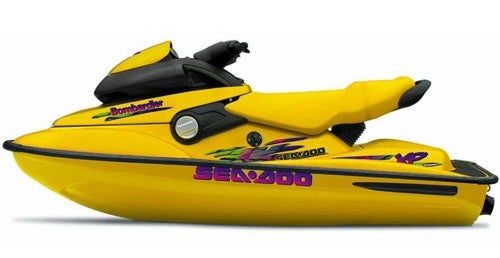
Remembering the Sea-Doo XP

Whatever Happened to the Wetbike?

2025 Yamaha JetBlaster Review

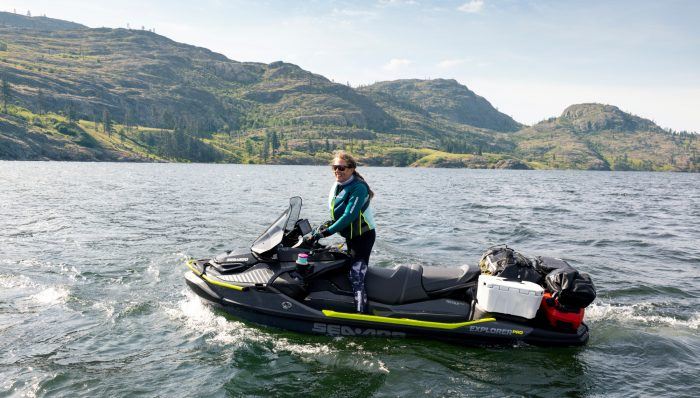
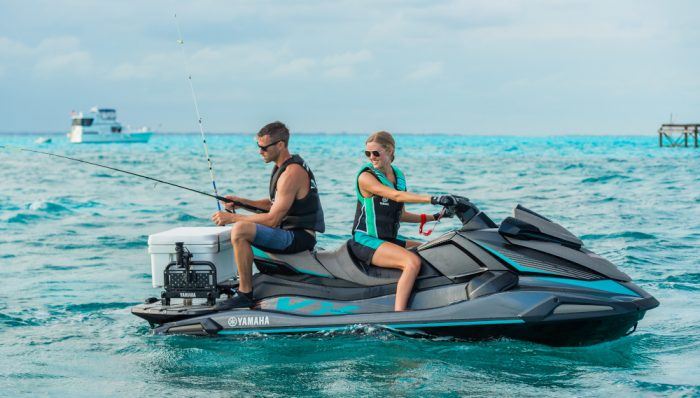

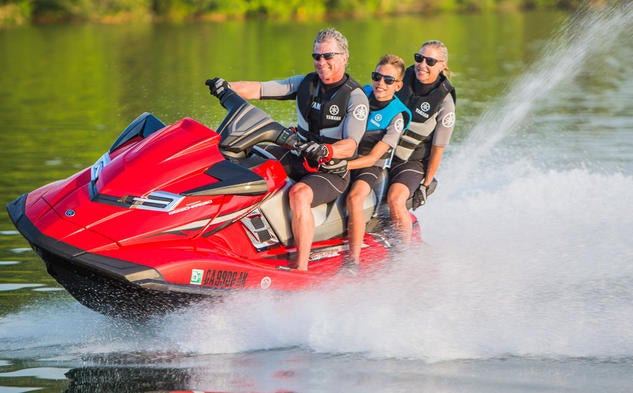



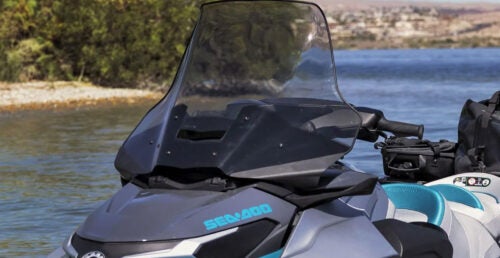



 Your Privacy Choices
Your Privacy Choices